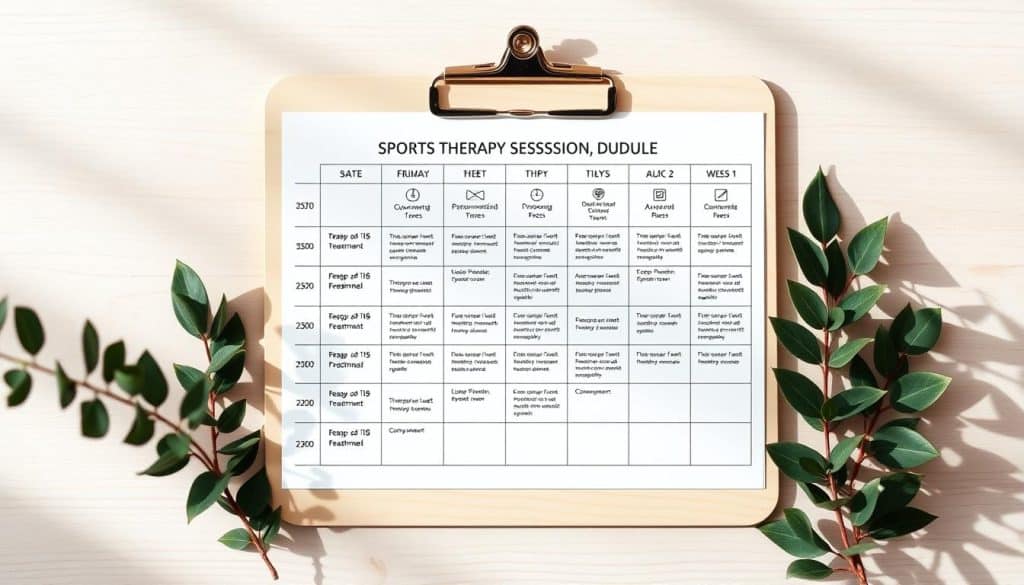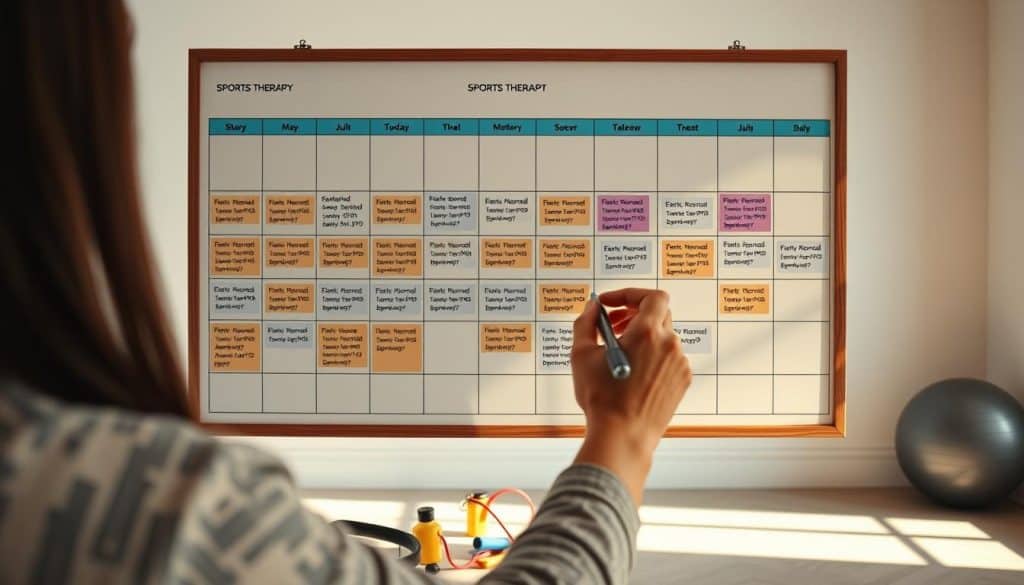Did you know 68% of active Calgary adults seeking recovery report uncertainty about how often they should attend treatment? Finding the right rhythm for your care isn’t just about convenience—it directly impacts healing timelines and overall wellness.
At Riverside Sports Therapy, we know personalized plans matter. Your body’s response to treatment depends on factors like injury type, fitness level, and lifestyle demands. A weekend warrior’s needs differ from a competitive athlete’s, and our Calgary-based team tailors schedules accordingly.
Consistency drives results more than session quantity. Overloading appointments can strain progress, while gaps between visits may slow momentum. We focus on sustainable rhythms that align with your daily life and recovery milestones.
Balancing immediate relief with lasting strength requires expertise. Our approach integrates pain management techniques with mobility-building exercises, adjusting visit frequency as you improve. This dynamic method helps prevent setbacks while keeping you engaged in your healing journey.
Key Takeaways
- Personalized schedules deliver better outcomes than generic plans
- Treatment intensity should match your current physical condition
- Regular attendance proves more valuable than occasional intensive visits
- Recovery timelines adapt as your strength and mobility improve
- Clear communication with providers ensures optimal scheduling
Understanding Your Healing Journey
Every recovery path unfolds differently, shaped by personal health factors and lifestyle demands. At Riverside Sports Therapy, we map out plans that respect your body’s natural rhythms while accelerating progress through targeted interventions.

Your Roadmap to Results
We start by identifying what success looks like for you. Whether you want to regain full mobility or return to favorite activities, your objectives guide how often we meet. Recent knee surgery patients might need three visits weekly initially, while chronic pain management could require biweekly check-ins.
Body Intelligence Approach
Our team evaluates four key elements during your first assessment:
- Current physical capabilities and limitations
- Medical history impacting healing speed
- Daily routines affecting recovery potential
- Progress markers indicating treatment effectiveness
We adjust schedules based on how quickly you rebuild strength between appointments. A construction worker with shoulder strain might need different spacing than an office employee with similar injuries. Regular progress checks ensure we’re always working with your body’s changing needs.
Factors Determining Session Frequency
Creating an effective care schedule requires balancing multiple elements unique to your situation. Our team evaluates your physical needs alongside practical realities to design plans that deliver results without overwhelming your routine.

Health Status and Physical Needs
Your body’s current state plays the biggest role in scheduling. Recent traumas typically demand closer monitoring, while long-term concerns benefit from spaced-out visits. We assess:
- Type and intensity of physical discomfort
- Existing health challenges affecting recovery
- How quickly you regain movement after interventions
Expert Guidance Meets Personal Effort
Our specialists combine clinical expertise with your daily realities when planning visits. They’ll suggest timelines based on proven methods while considering:
- Your ability to attend appointments consistently
- Time available for home exercises
- Progress made between scheduled visits
Community Resources and Practical Access
Convenient care matters for lasting success. We factor in Calgary’s health infrastructure and our central location near public transit routes. Alberta’s care standards help shape visit intervals while preserving flexibility for your unique needs.
Sports Therapy Session Frequency Guidelines
Structured care plans thrive when balancing proven methods with personal adaptability. While research-backed patterns exist, your healing journey deserves a rhythm matching your body’s responses and daily commitments.

Foundational Care Patterns
Most rehabilitation programs begin with 1-3 visits weekly. Recent injuries often need closer monitoring—2-3 appointments each week during early stages help manage discomfort effectively. For persistent conditions, initial visits might cluster more tightly before spacing out as you gain stability.
Consistency matters more than intensity. Weekly check-ins create momentum better than irregular bursts of care. We track improvements through measurable markers like increased mobility or reduced medication use, adjusting timing as needed.
Customizing Your Plan
Your lifestyle and recovery pace shape appointment spacing. Manual laborers might require different intervals than desk workers with similar injuries. We consider:
- Work demands affecting rest opportunities
- Progress consistency between visits
- Ability to complete home exercises
Post-surgical cases or complex conditions may break from standard patterns. Regular communication ensures your schedule evolves with your healing process, preventing stagnation while avoiding overwhelm.
At-Home and Clinic Based Recovery Strategies
Your path to lasting results combines professional guidance with daily commitment. We design care plans that work seamlessly in treatment rooms and living rooms, helping you build resilience wherever life takes you.

Benefits of Consistent Home Exercises
Daily movement between appointments keeps progress steady. Short, focused routines help maintain gains from clinic visits while building confidence in your body’s capabilities. Most patients see better results when combining structured care with personalized home practice.
Your custom program includes:
- Targeted strength-building moves for affected areas
- Flexibility routines to prevent stiffness
- Clear video demonstrations for proper form
- Adjustable durations matching your energy levels
We recommend 20-30 minute home practices most days. These bite-sized efforts add up – like depositing coins in a recovery bank. Regular check-ins let us refine your routine as you improve, ensuring every movement counts toward your goals.
Patients who stick with their home plans often reduce total treatment time. Simple consistency creates compounding benefits, turning small efforts into major milestones. Remember: healing happens between appointments too.
Managing Recovery with Consistent Scheduling
Building a sustainable recovery rhythm requires both structure and flexibility. At Riverside, we craft care strategies that adapt to your evolving needs while maintaining the consistency needed for lasting improvement. Your path to independence balances expert support with self-management tools.

The Role of Structured Treatment Plans
We design clear roadmaps outlining appointment timing and measurable goals. These living documents evolve as you regain strength, ensuring every phase serves your current condition. Key components include:
- Phased timelines addressing immediate relief and long-term mobility
- Checkpoint assessments every 2-3 weeks
- Adaptable scheduling for unexpected life events
- Visual progress trackers showing measurable gains
Integrating Treatment with Exercises and Rest
Your plan combines professional care with daily practices that reinforce healing. We balance active interventions with crucial recovery periods through:
- Custom home routines matching your energy levels
- Activity modification guidelines for work and leisure
- Scheduled rest days to prevent overexertion
Regular communication helps us adjust timing as needed. Patients who maintain their schedule typically achieve better mobility faster, with 78% reporting sustained results six months post-treatment. Remember: your commitment between visits powers lasting change.
Personalizing Your Sports Therapy Journey
Your recovery journey thrives through partnership with skilled professionals who listen. At Riverside Sports Therapy, we craft plans matching your body’s unique rhythm rather than forcing rigid templates. Success emerges when care adapts to your evolving needs.
Effective physical therapy balances clinic visits with home efforts. While some benefit from multiple times weekly initially, others progress through spaced-out check-ins. What matters most isn’t how often you attend, but how well each session connects to your daily progress.
Open dialogue with your physical therapist ensures alignment between treatment and real-life demands. We adjust timelines based on measurable improvements in mobility or strength, never pushing unnecessary frequent sessions. Lasting results come from steady effort, not rushed intensity.
View your plan as building blocks toward lasting wellness. Whether managing recent injuries or chronic conditions, our Calgary team helps you invest wisely in long-term health. Together, we’ll find the right form of support to keep you moving forward.
